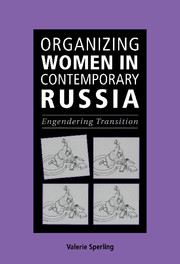Book contents
- Frontmatter
- Contents
- List of tables
- Acknowledgments
- Note on transliteration
- Map
- Introduction
- 1 Russian women's movement groups and activists
- 2 Analyzing social movements
- 3 Feminism, femininity, and sexism: socio-cultural opportunities and obstacles to women's movement organizing
- 4 “Democracy without women is not democracy!”: political opportunities and obstacles to women's movement organizing
- 5 “Unemployment has a woman's face…”: economic opportunities and obstacles to women's movement organizing
- 6 Remembrance of things past: the impact of political history on women's movement organizing
- 7 International influences on the Russian women's movement
- Conclusion
- Appendix
- Selected bibliography
- Index
2 - Analyzing social movements
Published online by Cambridge University Press: 22 September 2009
- Frontmatter
- Contents
- List of tables
- Acknowledgments
- Note on transliteration
- Map
- Introduction
- 1 Russian women's movement groups and activists
- 2 Analyzing social movements
- 3 Feminism, femininity, and sexism: socio-cultural opportunities and obstacles to women's movement organizing
- 4 “Democracy without women is not democracy!”: political opportunities and obstacles to women's movement organizing
- 5 “Unemployment has a woman's face…”: economic opportunities and obstacles to women's movement organizing
- 6 Remembrance of things past: the impact of political history on women's movement organizing
- 7 International influences on the Russian women's movement
- Conclusion
- Appendix
- Selected bibliography
- Index
Summary
Scholars of contentious politics have argued that social movements are likely to fare best where “parliamentary politics, democratic institutions, and durable political competition” have already taken root. In places where those conditions do not hold, such as the post-Soviet states, we can fully expect social movements to look and behave differently from their Western counterparts. But whatever their appearance and characteristics, all social movements – in any country – are engaged in attempts to serve essentially the same purpose: to work toward social change that will rectify a situation perceived as unjust. In other words, social movements strive to alter the status quo of the power distribution in society – whether at the level of material resources or the more intangible level of status and “identity.” Most often, social movements, including the women's movement in Russia, entail struggle over a combination of these material and intangible interests.
By the mid-1990s, the Russian women's movement was conducting that struggle under extremely strained conditions. Women's organizations were uniformly poor, run by volunteers on “enthusiasm,” while the economic circumstances surrounding them became increasingly desperate. Women suffered most, as a group, from the deepening economic crisis. Russian women rapidly went from having one of the highest labor force participation rates worldwide – over 90 percent – to being the least employable workforce in Russia, making up approximately two-thirds of the unemployed in 1994. Affordable daycare, once widely available (if of low quality), became a rarity, as factories cut such “luxuries” out of their budgets.
- Type
- Chapter
- Information
- Organizing Women in Contemporary RussiaEngendering Transition, pp. 43 - 53Publisher: Cambridge University PressPrint publication year: 1999



